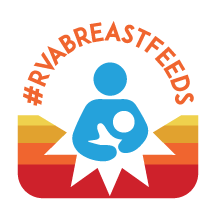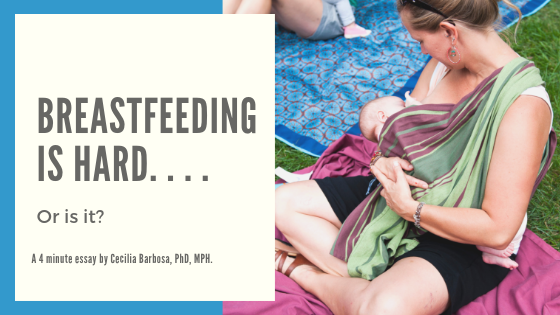Breastfeeding is Hard. . . or is it?
/We open World Breastfeeding Week 2019 with #RVAbreastfeeds member Cecilia Barbosa reading her 4-minute essay, first delivered at the International Breastfeeding and Feminism Conference, Chapel Hill, March 2019.
Breastfeeding is Hard. . . or is it?
“Breastfeeding is hard.” I hear and see this message in social groups, the media, and also in professional groups. I googled the term and 190 entries on 19 pages came back! It does make sense: we know many people have difficulties with lactation. Sore nipples, latch problems, infections, biting. We all know that. And I know many of you can tell lots of stories of difficult experiences.
But is “breastfeeding is hard” a helpful message? Some insist we need to say that because breastfeeding does not come easily and naturally. Rather it is a skill, and like learning to ride a bike, it takes work, patience and persistence to breastfeed with confidence.
There is a risk to this message. When we say, “breastfeeding is hard,” aren’t we implying that it’s the failure of the parents’ or babies’ bodies that make it difficult to breastfeed? Aren’t we placing the responsibility for any difficulties squarely on the shoulders of the breastfeeding dyad?
But, is breastfeeding inherently hard or is it that the conditions in which families live make it hard to breastfeed? In contrast to the US where not even 30% of women breastfed at 12 months [1], in 2011, in Mozambique, 87% of 12-17 month old children breastfed [2]. So, if breastfeeding is hard, how is this possible, in a country that has a fraction of the financial resources of the US? I think many of us in this room know or suspect the answer. My guess is that there is strong family, sisterly, brotherly, and societal support, that it is an accepted practice, passed on from generation to generation. That is a special type of wealth.
So, coming back home.
What if, in addition to helping the breastfeeding dyad, we create the conditions for them to be successful in the first place?
What if breastfeeding dyads were welcome in parks, gyms, restaurants and buses?
What if all workers were granted six months of paid leave upon the birth of their child and all employers unquestioningly provided time and space for expressing milk?
What if all new mothers were not released from their hospital beds after 24 hours or even better, births were in beautiful settings that honored this special time in our lives [3]?
What if we made sure parents felt comfortable with breastfeeding or were assured good support before sending them home?
What if, when returning home, (and all new parents and babies need a home to go to), family and friends help with chores and meals so that new parents can focus on their new baby?
What if, a trained doula, lactation counselor or consultant, visited each new parent after birth?
What if we lived in a society where the breast is desexualized and breastfeeding in public became no big deal?
What if we didn’t have to constantly fight the commercial interests that want to thwart and complicate breastfeeding?
Who benefits when we say breastfeeding is hard? Our breastfeeding families? Or, let’s think about that: if we’re saying breastfeeding is hard, aren’t we implying that the alternative, formula, is easy?
By saying breastfeeding is hard, aren’t we letting our institutions, our laws, our environments continue to ignore the very real and daily needs of breastfeeding dyads for institutional, legal and environmental support?
Instead, we need to push for consistent and strong societal support and infrastructure, so that each dyad who’s physically and emotionally capable will learn to breastfeed, with patience, practice and persistence. And surely, our breastfeeding families can be just as successful as our friends in Mozambique!
[1] Centers for Disease Control and Prevention. Breastfeeding among U.S. children born 2009-2015, CDC National Immunization Survey. Accessed at https://www.cdc.gov/breastfeeding/data/nis_data/results.html, April 1, 2019.
[2] Ministério de Saúde de Moçambique, Instituto Nacional de Estatística. Moçambique Inquérito Demográfico e de Saúde,2011. March 2013, p. 159.
[3] Attributed to Leslie Lytle, Executive Director of Nurture, Richmond, Virginia, USA.
Cecilia Barbosa, PhD, MPH: My interest in breastfeeding began during the formula boycott of the 70s when the world was alerted to and alarmed by the deaths resulting from formula being heavily promoted in third world countries and consumed in poor hygienic conditions. I am indebted to an anonymous La Leche League volunteer who patiently helped me overcome initial breastfeeding challenges over the phone. Increasing breastfeeding is a highly impactful public health intervention in this country and around the world.
I have 20+ years’ experience in public health - as independent consultant; Director, Division of Child and Adolescent Health, Virginia Department of Health; and ED, Virginia Public Health Association. I received a PhD in social and behavioral health from VCU, Masters’ degrees in Public Health and City Planning from UC Berkeley and a BA in Biology from Smith College. I chair the Virginia Latino Advisory Board, serve on the Jenkins Foundation and Dancing Classrooms of Greater Richmond boards, and RVA breastfeeds. A citizen of Brazil and USA, I am fluent in Portuguese, Spanish, and French.



